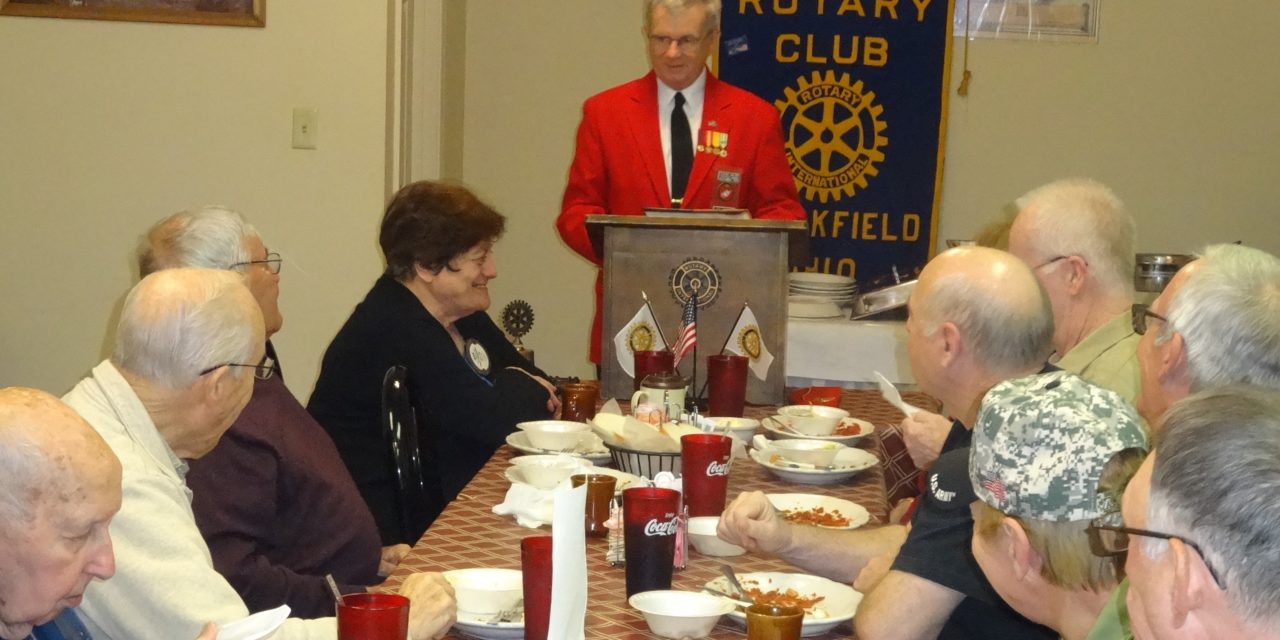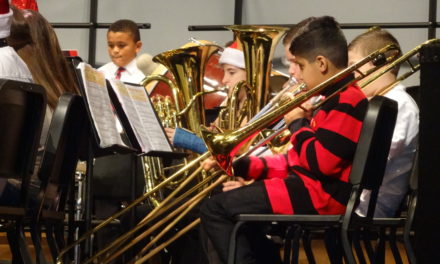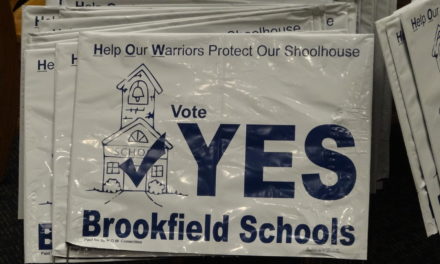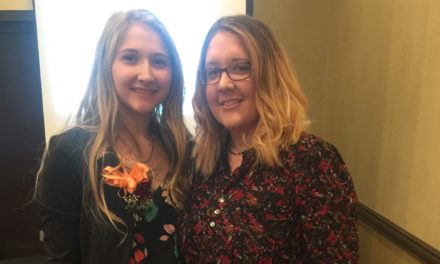December 2017
When you get a bunch of veterans together, some of them will have hard core stories of combat.
And that can leave those who did not serve under fire almost embarrassed by their service.
But Ellwood F. Walker, a Marine veteran who participated in search-and-destroy missions in Vietnam, assured vets that they have nothing to feel embarrassed about.
“It doesn’t matter where your served or when you served or if you saw combat or not,” Walker, president of the Brookfield Rotary Club, said at a club Veterans Appreciation Lunch Nov. 14.
“We all took the same oath, that we would defend this country up to, with and including our lives,” Walker said. “If called upon, we would have all served in combat.”
Among those honored at the lunch:
Carl Brickey, a 95-year-old World War II vet, who was brought to the event by his great-grandson, Spencer Toro.
William “Bill” Litman, who was drafted in 1950 and took basic training with 101st Airborne in Breckinridge, Ky. He served in Japan with general headquarters command and was discharged in 1952
Wade Foltz: “I’m embarrassed to say I was in the military after those fellows here. I didn’t want to go to Vietnam, guys, that’s the reason I got in the reserves. But, I do respect each and every one of you that did go overseas and fought and helped serve this country.”
John Jablonski , who served in the Army from 1965-67, and served in an airborne unit. “I did jump about 40 times, C-130, C-124, C-141,” he said, naming the planes he jumped from.
Dan Suttles, the township trustee-elect, who served in the Air Force from 1978-82. “They did stage the (Iranian) hostage rescue mission out of my base in Germany, which was a failure, but that was the only eventful thing that happened in my four years.”
George Chomos, who served from 1965-68 in the finance corps in Germany.
Larry Kremis, who served from 1966-68, including 15 months in Bangkok, Thailand. “It’s a (rest and relaxation) center. There was a point I got embarrassed. I was in a lot of bars in Bangkok. There’d be soldiers from Nam coming tor R&R. We’d get to talking. They’d ask, ‘Where are you stationed?’ I would tell them, ‘Two blocks that way.’ They would just sink. I started lying after a while. I worked for MACTHAI, Military Assistance Command Thailand. I started lying to them, telling them I worked in MACV (Military Assistance Command Vietnam) in Saigon.”
Kremis called his service “an experience of a lifetime. You grow from it, you really do. I’m happy and proud to have served.”
Bob Mangold, Army, 1965-95
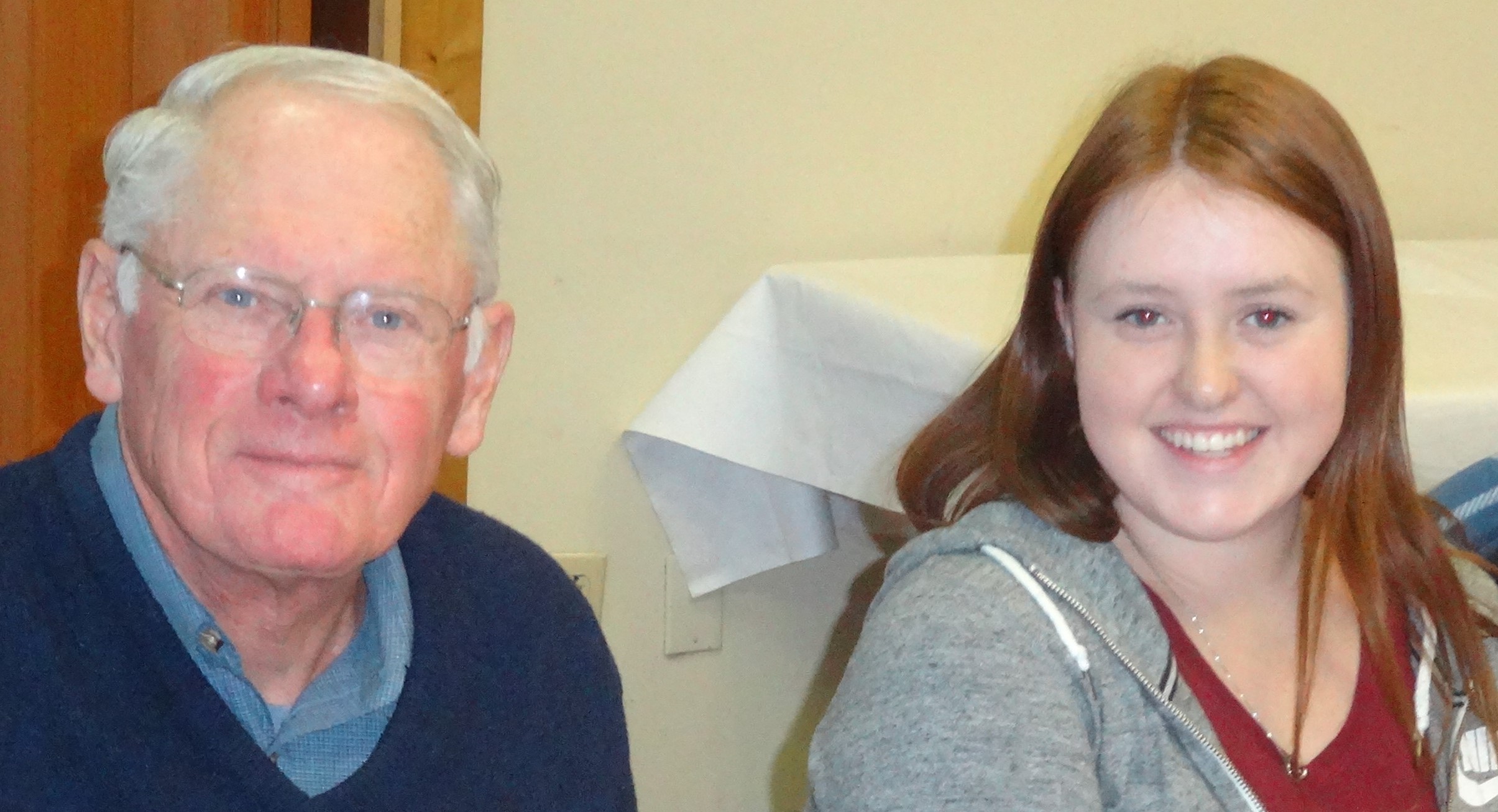 Bob Mangold has been teaching in public schools for 20 years, but he hasn’t entirely moved beyond the career that he had for 30 years before he started teaching – as a career Army man.
Bob Mangold has been teaching in public schools for 20 years, but he hasn’t entirely moved beyond the career that he had for 30 years before he started teaching – as a career Army man.
When the opportunity presents itself, Mangold talks to students in the Brookfield and Maplewood school districts about life in the Army, he said.
“I tell them the pluses and minuses,” the Cortland man said. “I never tire of doing that.”
Mangold was active duty from 1965 to 1995, achieving the rank of full colonel. He was assigned to the military intelligence corps and served two tours of duty in Vietnam, two years in Korea, six years in Germany and seven years at the Pentagon.
He led at the company, battalion and brigade levels, and his final assignment was as secretary to the chief of staff of the Army and the secretary of the Army.
“I enjoyed most of it but not all of it,” Mangold, 74, said at the Brookfield Rotary Club’s Veterans Appreciation Lunch on Nov. 14, a guest of Krysta Wedge.
He enjoyed being with troops, teaching them survival skills and helping them transition from military to civilian life; the travel; and the challenge “of all the different jobs that were laid before me,” particularly having the chance to be in charge of assignments and following through to their successful completion.
“No matter how bad things were, I knew they were going to change,” Mangold said.
As a substitute high school teacher, “I’ve always come to Brookfield,” he said. “I only go to Brookfield and Maplewood schools.”
His loyalty to his country is echoed in his loyalty to Brookfield.
“I think it’s a good school system,” he said. “They’ve always asked. They never hesitated asking. Where I come from, when you’re asked, you respond.”
Jim Miller, Army, 1968-70
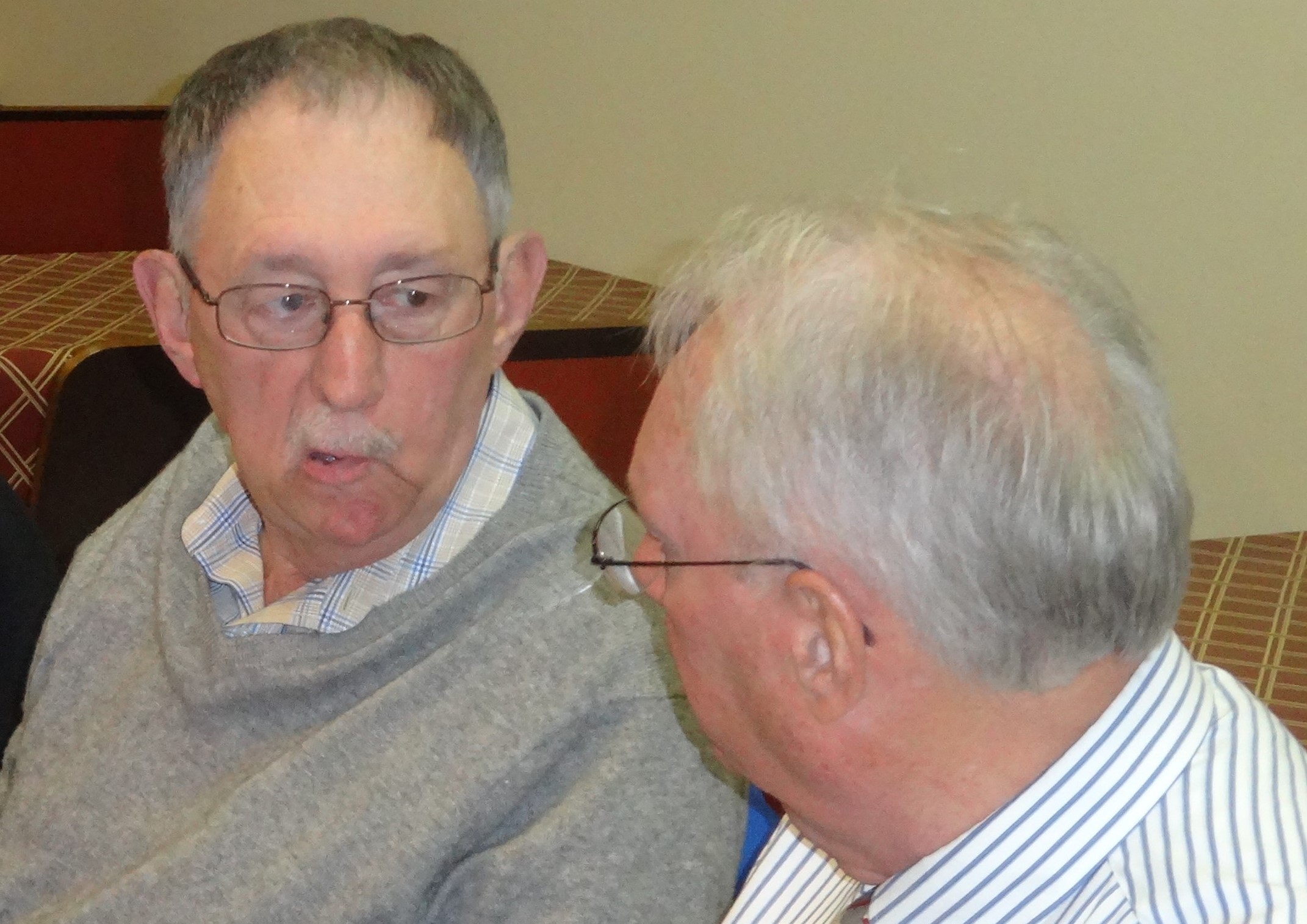 There were several times during his Army service when Jim Miller was scared, wasn’t sure what was going on, figured he was in for a rough time.
There were several times during his Army service when Jim Miller was scared, wasn’t sure what was going on, figured he was in for a rough time.
Nearly 40 years removed from those days, Miller said he’s glad he went through it.
“It made me grow up,” he said.
Miller, who was raised on the West Hill and was a 1965 graduate of Brookfield High School, was drafted into the Army in 1968.
“First time I was ever on a plane, got on a C-130 out of Cleveland,” he said of the trip to Fort Knox, Ky., for basic training.
After he arrived, “We were hungry and all they give us was a glass of milk and a cheese sandwich and said, ‘Welcome to the United States Army,’” Miller said.” I said, ‘Uh, oh. This is going to be a rough time.’”
After basic, he was sent to Fort Gordon, Ga., for military police school.
“Next thing I know, they said, ‘Now, you’re going to go to Vietnam,’” Miller said. “I said, ‘Oh, oh.’ I wasn’t crazy about it.”
When he first got to Vietnam, Miller was sent to a replacement center near Bien Hoa Air Base and Long Binh Post, outside of Saigon.
“First couple days they had us cleaning latrines, all kind of dirty jobs,” he said, then he was bused 40 miles to Saigon.
“We get on this old bus,” he said. “We’re in the boondocks out in the middle of nowhere. I couldn’t figure out. I says, ‘Nobody’s got a gun. This don’t make sense to me.’ I’m already scared.”
His destination was Saigon.
“Ended up, I had to bust people for drugs at Saigon Tan Son Nhut Air Base,” Miller said. “I worked with security police in the Air Force. We checked everybody’s luggage and baggage whenever you came in. We had a dog that was trained. He would go find the dope just like that.”
Among the troops he encountered were “ three guys from Brookfield”: Bob Hardy, Tom Hood and Stu Cooper.
“It was funny that I run into three guys from Brookfield in the service over there and they were all in different … Air Force, Navy and the Army,” Miller said
He was discharged at age 22.
“I come home, my dad, says, ‘What happened? You changed.’ I said, ‘Dad, I’m not a boy no more, I’m a man.’ I was 140 pounds, kind of a weakling, when I went in. I come back I was 190 pounds,” Miller said. “Discipline and respect that I learned in the service, being around other people and learning discipline, was probably the best thing that ever happened to me, to be honest with you,” he said. “God bless all the veterans.”
Don Rust, Air Force, 1956-60
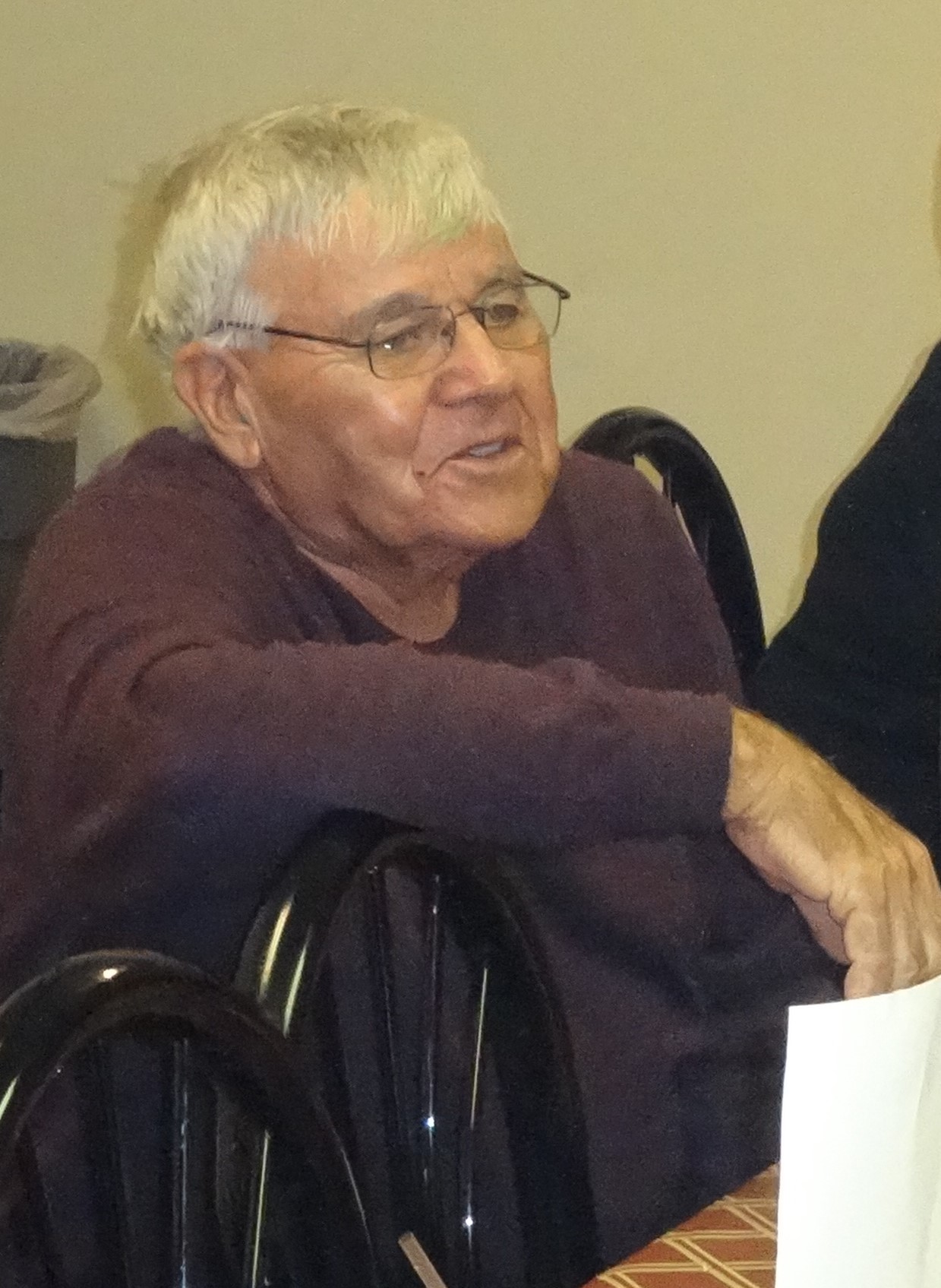 “A week after I graduated, I went into the Air Force,” Don Rust said.
“A week after I graduated, I went into the Air Force,” Don Rust said.
To this day, the Masury man doesn’t have an explanation for why he enlisted right out of high school, but he doesn’t regret it.
“It was interesting. I enjoyed it.”
Rust served from 1956 to 1960 as an aircraft mechanic, maintaining C-124s.
“They used to haul all the army stuff around back then,” Rust said of the workhorse aircraft. “I think I did 200 trips in one of them. Hauled tanks and everything. That was one of the last reciprocating engines they made. It had 28 cylinders on it.”
The Hickory High School graduate – he lived in Brookfield while attending school in Hermitage — spent most of his military work days with his head craned back to work on C-124s – and to look for trouble.
“You had to stand underneath the engine when you started it because of fire,” he said. “I never saw one catch on fire.”
Rust, 78, served in the 53rd Troop Carrier Squadron of the 61st Airlift Wing at Donaldson Air Force Base, Greenville, S.C. But, he didn’t always stay there. He spent time at Rhein-Main Air Force Base near Frankfurt, Germany.
“I was down New Zealand three-and-a-half months,” he said, noting it took 48 hours to make the trek from California to the Kiwi state by plane. He was with a unit that supplied scientific outposts on Antarctica, and he got to fly over the frozen continent.
“I even had a couple of postcards mailed with the South Pole stamp,” said the retired dairy farmer.
Although Rust considered staying in, he deemed military life unfit for a family. He got married the year after he came out.
“I’ll tell you one thing, it made me appreciate home,” Rust said. “I realized how good I had it.”
That’s one thing he doesn’t think today’s young people realize, he said.
“Everybody figures you’re owed something,” Rust said. “There’s no free ride in this country. At least, there’s not supposed to be.”
That could be the irony of military service – people willing to put their lives on the line for others, even those who don’t appreciate it.
Ellwood Walker, Marines, 1962-67
When President John F. Kennedy told Americans, “Ask not what your country can do for you. Ask what you can do for your country,” Ellwood M. Walker took it to heart.
He enlisted in the military at 17, joining the Marines largely because of “Battle Cry,” Leon Uris’ novel based on his experiences with the Marines in World War II.
Walker served from 1962-67. He went to Cuba after the Cuban Missile Crisis, and saw action in Vietnam in 1966, performing search and destroy operations as part of the 1st Battalion of the 5th Marines.
Fifty years after he got out, Walker looks back fondly on his time. He relished the discipline and esprit de corps of those years, and saw his service as honoring those who came before him.
“I worked with some of the best people we’ve ever had,” said the lawyer and president of the Brookfield Rotary Club.
The drill instructors at Parris Island, S.C., one of the Marine boot camps, were the best teachers he ever had, he said.
“They were someone to pattern yourself after,” Walker said.
With so few Americans serving in the military anymore, few people understand military service, he said. However, Walker said he appreciates that people pause one day a year to note the service of veterans.
“It’s at least one day where everyone in the country looks at the veterans and thanks them for their service,” he said.
Personally, Walker looks on the day as “a time to look back and remember.”
Veterans in the schools
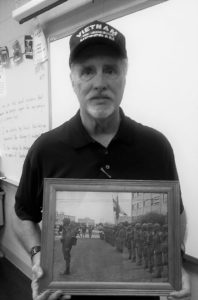 Patrick T. Gleason holds a photo of himself from his days as a member of the 82nd Airborne, based in Fort Bragg, N.C. Gleason, a substitute teacher in local schools, served from 1966-70 in the U.S. Army, including a year in Vietnam. Eighth-grade teachers Melanie Horn and Miriam Necastro are teaching the book “Inside Out and Back Again” in class, a tale of South Vietnamese who become refugees after the fall of Saigon. Gleason talked about his experiences in the country, showing photos of his battalion and his uniform.
Patrick T. Gleason holds a photo of himself from his days as a member of the 82nd Airborne, based in Fort Bragg, N.C. Gleason, a substitute teacher in local schools, served from 1966-70 in the U.S. Army, including a year in Vietnam. Eighth-grade teachers Melanie Horn and Miriam Necastro are teaching the book “Inside Out and Back Again” in class, a tale of South Vietnamese who become refugees after the fall of Saigon. Gleason talked about his experiences in the country, showing photos of his battalion and his uniform.
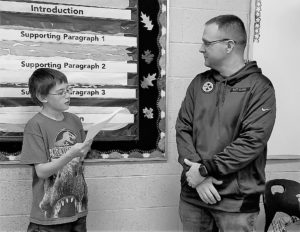
Sixth-grade student Robert Brode reads a thank-you letter he wrote to special education teacher Stephen Sambroak, an Air Force reservist who spent a year in Afghanistan flying Blackhawk helicopters on medical evacuation missions. Sambroak answered questions about his service from students of Gayle Jones and Tara Kovach, who had their students write thank-you letters. School Superintendent Velina Jo Taylor showed at a school board meeting a commemorative plaque of a mission Sambroak flew, and he nominated her and elementary Principal Stacey Filicky for the Patriot Award in honor of their support while he was overseas.

